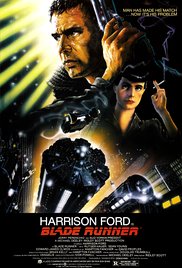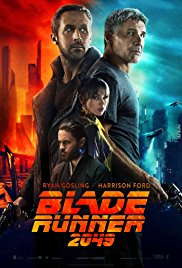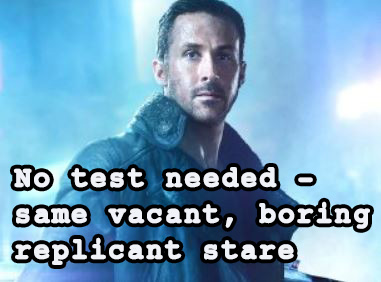With the premature demise of the Blade Runner sequel that no one was demanding, a postmortem may be instructive to writers and film makers.
** WARNING — SPOILERS ABOUND **
Blade Runner (1982)
The original was unique for its time and grew a following for its dazzling steampunk set design, and its genre collision of film noir and scifi. That is, it combined the gumshoe private eye with futuristic situations involving replicants – AI robots that are nearly indistinguishable from humans except that they lack certain emotional impulses, primary because their memories are manufactured instead of experienced.
 The typical heist “bank job” component of noir was replaced with the replicant’s search for a longer life. They have a hard-coded 4-year lifespan. While Deckard and others ponder why these criminals would risk capture by returning to earth, it should be obvious that they were interested in confronting their creator Tyrell to plead for a reprieve from death.
The typical heist “bank job” component of noir was replaced with the replicant’s search for a longer life. They have a hard-coded 4-year lifespan. While Deckard and others ponder why these criminals would risk capture by returning to earth, it should be obvious that they were interested in confronting their creator Tyrell to plead for a reprieve from death.
This created a more complex and profound theme that combined appreciation for our brief life and the desire for racial harmony. The former concept is directly addressed by Roy, who describes the wonders he has seen, and how these new experiences will be lost to time “like tears in the rain.”
Since EVERY living thing longs to meet their creator and to gain more time to live, love and achieve dreams, this “antagonist” goal achieves universal appeal. We almost want Deckard to fail, even as we want justice for these murderous replicants.
The latter concept addresses Deckard’s pursuit. He quit his job as a replicant killer before, and is dragged back into it by bigots desiring that these uppity [fill in the blank “other”] be put down for the animals they are. Deckard is already on his journey to accept replicants as worthy of the same life he shares, but once Roy saves his life, Deckard is sold, ready to take a replicant wife and flee to the mountains.
That said, Blade Runner is over-rated. The Blade Runner name is a too cool name for a tech janitor task. The plot development and pace is slow. The characters, including the oddball Sebastian, don’t resemble the audience so empathy is hard. Then there’s Harrison Ford’s monotone narration, and Gaff’s cartoon-like dialog (“She won’t live, but then, who does?”) that detract from the visual spectacle.
Lastly, the Deckard/Rachael romance has far more sexual assault than chemistry. We don’t buy their relationship. Yes, Deckard’s attraction to Rachael is physical, but also dominating. Perhaps we can shrug at the “any port in a storm,” better-we-run-off-before-she’s-shot-by-someone-else kind of togetherness, but it’s not love.
Plus, we never connect with Rachael. Sean Young’s performance isn’t exactly wooden, but it is sleepy.
Ridley Scott has tried to recut the original more than once, so even he isn’t completely satisfied.
Blade Runner 2049
Actually, only 35 years later, we get a sequel that has NONE of the mitigated transcendence of the original, and most of its shortcomings. It does increase the spectacle, but Hollywood has still not learned that spectacle doesn’t make a movie.
STORY does.
 Our protagonist “K” is an unemotional replicant interested in finding Rachael’s miracle baby after we learn that Tyrell figured out how to procreate with a sex doll. (How’s that for a relevant tech topic for today?)
Our protagonist “K” is an unemotional replicant interested in finding Rachael’s miracle baby after we learn that Tyrell figured out how to procreate with a sex doll. (How’s that for a relevant tech topic for today?)
This isn’t exactly Children of Men territory, especially since no other replicant treats replicant life as precious. Even Wallace, who is eager to perpetuate his species, treats others like lab experiments to slaughter out of boredom.
That is, am I really supposed to care about this journey if the replicants are more savage than humans? We don’t.
Do we really care where replicants’ implanted, programmed memories come from? No. That’s academic, not visceral (which is what you need for your character journey to connect to audiences)
Do we care if K is the miracle baby or not? No, because we don’t know what it means. Yes, we care if he learns what his life purpose is, but in this world, that’s a mitigated desire.
What’s not asked is, can we replicate replicants through this miracle baby? Is this the start of a new humanity to replace man? Who knows and who cares? What does this have to do with the way the audience lives their lives? Is it going to make us see life in a new way, and/or treat others differently? NO!
 And am I really supposed to care about K’s relationship with his hologram girlfriend? Seriously, it doesn’t matter how gorgeous the hologram Joi is. The relationship is as fake as Donkey Kong. The movie even shows you that it’s a program instead of experience when K meets the giant billboard version of Joi and she uses the same nickname and banter.
And am I really supposed to care about K’s relationship with his hologram girlfriend? Seriously, it doesn’t matter how gorgeous the hologram Joi is. The relationship is as fake as Donkey Kong. The movie even shows you that it’s a program instead of experience when K meets the giant billboard version of Joi and she uses the same nickname and banter.
The film makers try to shoehorn some humanity into this dreary matrix by allowing old Deckard to meet his daughter. The reason this also doesn’t work is that we don’t have a relationship with the daughter. She’s a shut-in, with two scenes. She seems nice, but we don’t have a connection with her, and neither does Deckard.
BR49 is what happens when writers breathe the flumes of the scifi spectacle for too long and forget their audience. They never asked how replicants are an extension of our real humanity.
How to Fix the “Franchise”
Instead of colliding an immaculate conception with the fabrication of childhood memories, I would begin with the meaning of Blade Runner. This concept indicates a fine line between two incompatible worlds, and that this edge is sharp and dangerous.
Keep that in mind as we explore the possibilities (and perhaps we should treat BR49 like Highlander II: the Quickening and ignore it).
First, tell the story through:
- A human protagonist, so we directly empathize with the moral decisions he has to make in order to complete the mission; or
- A replicant protagonist whose ability to become “more human than human,” shames the human forces of antagonism into a conversion of their own. A replicant “traveling angel” is a variant on this idea.
Next, establish a visceral desire line. Say, if they discover that a strand of the replicants figure out a way to birth more of their kind, the humans fear being overrun and try to destroy that process. Now you have a victimized minority against a system trying to dictate their reproductive rights (Margaret Sanger, anyone?).
This establishes a kind of slavery that several characters can battle against, rather than a mystery of one, unrepeatable outlier.
Then we need to add one of the basic tools of drama: dilemma. That is, the choice between two equally negative outcomes (and realizes the Blade Runner label). The protagonist who believes in, say, liberty over equality, will be forced to choose against their belief in a circumstance where liberty produces a horrific outcome.
In my novel, Knight of the Temple, my protagonist, Elias, believes in the Templar religious order, and so, sets off to prove them innocent of heresy. However, every clue he discovers makes them seem guilty. He’s caught between his inherent need to discover the truth in order to set them free, and the fear that his discovery will condemn them all to hell.
That’s the kind of dilemma that needs to drive a complex narrative.
The set up must cause the hero to compromise his morals for immediate gain (the easy vs the right), and that decision will cause more issues to complicate the story.
The replicants’ need should be more than reproduction or memories. The question of life is about consciousness. Consciousness is very difficult to explore on screen without going full Hardcore Harry on us.
This is why we should stick with social commentary about the “other.” Since the replicants are different from humans, and used to do tasks humans can’t, perhaps they learn something about the nature of the universe that humans don’t.
Since I’m not paid to develop the next script, I’ll stop here, but I would go with a more underground railroad concept that pits a human Blade Runner against human replicant traffickers that are concealing something about the meaning of existence or the afterlife.
Will We Ever See a Story Like That Again?
Movies are a safe exploration and catharsis of human dreams and fears in a safe setting, so that we can go back to our thoughts and relationships with something that is both sweet and useful.
The true reason Hollywood is declining is not because of alternate platforms, social media, CGI fatigue or anything else related to spectacle. It’s the story, stupid.
Now go write something great (or leave ideas in the comments below). 🙂
